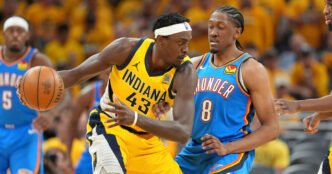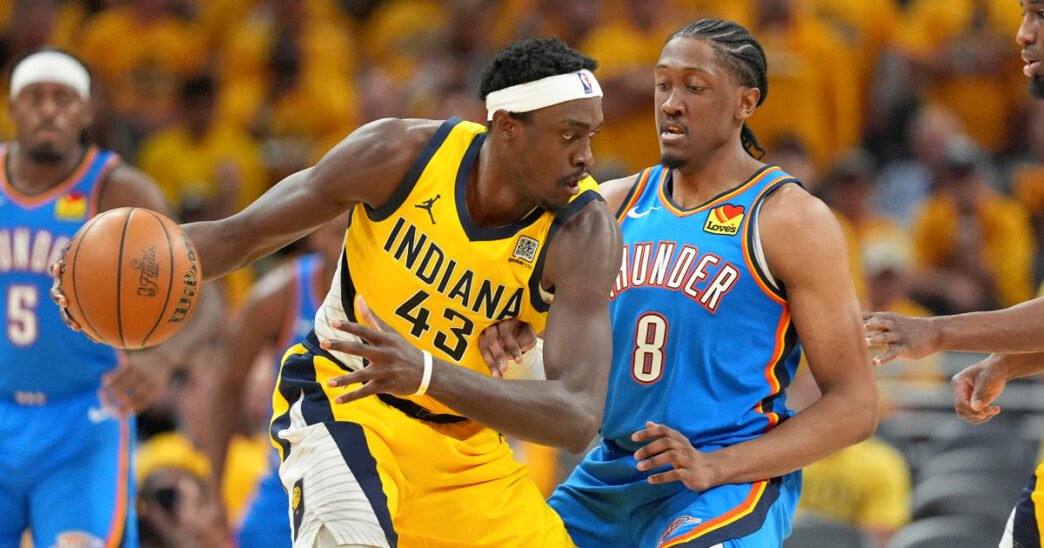The Indiana Pacers didn’t need one of their signature, improbable comebacks to win Game 3 of the NBA Finals. And because of it the Oklahoma City Thunder, once the heavy favorite to claim the league championship, will now need a rally of their own to keep their title hopes alive.
During a bravura fourth quarter Wednesday in Indianapolis, the Pacers unleashed their best defense of the series and hustle on offense to force Oklahoma City into uncharacteristic mistakes and earn a 116-107 win and 2-1 lead in the best-of-seven series.
NBA history suggests that the significance of this victory is hard to overstate: The team that wins Game 3 of an NBA Finals tied 1-1 goes on to win the series 80.5% of the time.
Game 4 is Friday in Indianapolis.
Oklahoma City scored only 18 points in the fourth quarter, while making only six of its 17 shots, and was outscored by 14 points in the game’s decisive final 12 minutes. Thunder star Shai Gilgeous-Alexander, the league’s Most Valuable Player, was held to just 1-of-3 shooting over that span largely under the harassing defense of Pacers forward Pascal Siakam.
Gilgeous-Alexander finished with 24 points, but needed 20 shots, and he committed six turnovers.
Indiana is 24-3 this season when holding opponents to fewer than 110 points — including 14-0 at home.
“It wasn’t all bad,” Thunder coach Mark Daigneault said. “But we definitely have to play our style and impose our will for more of the 48 minutes if we want to come on the road and get a win.”
Tyrese Haliburton scored 22 points with 11 assists and nine rebounds in a much more aggressive performance than he had authored three days earlier during a series-tying loss in Oklahoma City. Yet the Pacers’ hero Wednesday was reserve Bennedict Mathurin, who failed to play even a single second during the opening quarter, yet went on to score 27 points over his next 22 minutes. It was the highest-scoring performance by a reserve in the Finals since 2011, and his offensive outburst helped Indiana’s reserves outscore Oklahoma City’s 49-18.
At halftime, holding a 64-60 lead, Indiana looked like a different team than had returned from Oklahoma City with a 1-1 split.
They had scored more points in transition — one of the secrets of the team’s postseason success — in just two quarters than they had scored in any of the two previous games. Indiana finished with 17 fast-break points, nearly tying its total from the first two games of the series.
And the Pacers’ reserves had scored 30 points by halftime, which was not only nearly half the team’s total but also 19 more than Oklahoma City’s own bench, the same unit that had decisively swung Game 2 in the Thunder’s favor.
Indiana point guard TJ McConnell and Mathurin were primarily responsible for that turnaround by the Pacers’ bench. Shortly after they entered, the Pacers trailed by eight points, but McConnell had soon pestered the Thunder into three steals, including two in the backcourt. And after making five shots total in the first two games of the series, Mathurin made five of his six shots in the first half alone of Game 3.
Their play earned Indiana a halftime lead. Yet Indiana’s poor finish to the third quarter, scoring just five points over the final five minutes, earned it an uphill challenge, and a five-point deficit, entering the final quarter. Oklahoma City’s vulnerability — perhaps its only one — was its lack of playoff experience, and it made the series’ return to Indiana a critical opportunity for the Pacers.
Oklahoma City indeed displayed unexpected flaws. Its 19 turnovers were its most of these playoffs.
Yet despite their youth, the Thunder at times also showed steely resolve. Rather than become rattled by playing on the road, Thunder All-Star Jalen Williams, in only his third season, led Oklahoma City out of tight jams with both his scoring and passing late in the third quarter, and Williams’s layup with seven minutes to play in the fourth quarter helped erase what had been a four-point Indiana lead.
Yet Indiana, so good at comebacks throughout this postseason, played superbly in the final minutes while building and protecting its lead.
First with five minutes to play, and again just 35 seconds later, the Pacers grabbed two offensive rebounds that turned into four points when the Thunder failed to box out. Breakdowns like that helped Indiana extend its lead to eight with 3:20 to play.
“They really outplayed us in the fourth,” Oklahoma City coach Daigneault said.
The Thunder have already faced a similar position in these playoffs, when it lost two of the first three games against Denver in the second round, and ultimately came back to win the series.













